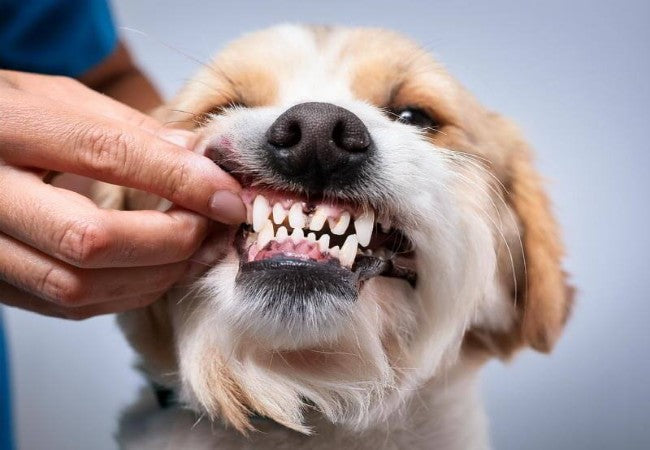Dog Teeth: How Many, Types, Loss & Dental Health 2025 Vet Guide 🐶🦷

In this article
Dog Teeth: How Many, Types, Loss & Dental Health 2025 Vet Guide 🐶🦷
By Dr. Duncan Houston BVSc
🔍 Puppy Teeth vs Adult Teeth: What's the Count?
Puppy Teeth – Puppies are born toothless. They begin to grow their deciduous (milk) teeth at ~3–4 weeks and typically have 28 baby teeth by 6–8 weeks old.
Adult Teeth – Permanent teeth erupt between ~3–7 months, culminating in a full set of 42 adult teeth: 20 in the upper jaw (maxilla), and 22 in the lower jaw (mandible).
🦷 What Are the Different Types of Dog Teeth?
Dogs possess four major types of teeth, each fulfilling unique functions:
- Incisors (12): Small front teeth—6 upper, 6 lower—used to nibble, scrape, and pick up items.
- Canines (4): The long, pointed “fangs”—2 upper, 2 lower—designed for gripping, tearing, and defense.
- Premolars (16): 8 upper, 8 lower—sharp-edged teeth for shearing and cutting food.
- Molars (10): 4 upper, 6 lower—flattened teeth at the back for grinding and breaking down food.
📅 Teething Timeline: When Do Puppies Lose Their Teeth?
Puppies begin shedding baby teeth around 3–4 months (12–16 weeks), a process which continues until ~6–7 months of age. The incisors and canines emerge first, premolars follow around 4–6 months, and molars usually appear last between 5–7 months.
Losing teeth and finding small baby teeth around the home is normal, though they are often swallowed.
⚠️ What’s Not Normal: Adult Tooth Loss
Losing adult teeth is not typical. If this occurs, it usually signals dental disease like periodontal infection, trauma, or advanced oral issues. Adult tooth loss requires prompt veterinary evaluation.
Periodontal disease affects up to 80–90% of dogs over age 3 and can impact heart, liver, and kidney health.
🔑 Common Dental Problems & Why They Matter
- Retained baby teeth: Baby teeth that don’t fall out can crowd adult teeth and lead to tartar buildup or misalignment—these often need removal.
- Periodontal disease: Plaque and tartar build-up leads to gum inflammation, bone loss, infection, and loose teeth—and can affect overall health.
- Tooth wear & trauma: Chewing hard objects may cause cracks, wear, or root exposure—leading to pain and potential infection.
🧼 Routine Dental Care: Brushing & Beyond
Daily brushing with a soft dog toothbrush and toothpaste is the gold standard—helps reduce plaque, tartar, and oral disease.
- Introduce brushing early (months old)—use gentle praise and gradual desensitization.
- Use Veterinary Oral Health Council (VOHC)-approved chews, toys, or diets to supplement brushing.
- Be cautious with hard items like bones or stones; opt for vet-recommended chew toys for safe oral exercise.
🩺 Veterinary Dental Checkups & Treatments
- Professional cleanings under anesthesia are important to remove plaque above AND below the gumline—essential for preventing disease.
- Extractions and dental surgery may be needed for retained teeth, fractured roots, or loose adult teeth.
- Radiographs (X‑rays) assess hidden issues like root abscesses or bone loss.
- Follow-up every 6–12 months and for any signs such as bad breath, bleeding, or decreased appetite.
📝 Dr Houston’s Dental Health Checklist
- ✔️ Know your dog’s dental timeline: 28 baby teeth → 42 adult teeth.
- ✔️ Monitor teething for retained teeth; seek vet care if observed.
- ✔️ Brush daily with dog-specific tools; use VOHC-approved chews.
- ✔️ Avoid hard hazards that can fracture teeth.
- ✔️ Schedule annual vet checkups and professional cleanings.
- ✔️ Watch signs of disease—bad breath, bleeding, loose teeth—and act promptly.
- 📲 Ask A Vet is available for personalized dental advice anytime.
🌟 Final Thoughts
Understanding your dog’s dental anatomy—and when tooth loss is normal (puppy teething) versus a red flag (adult periodontal disease)—is key to lifelong oral health. With routine brushing, trusted chew toys, and regular veterinary cleanings, your dog can maintain a strong, healthy smile—and their overall well-being will shine too! 🐾❤️
Need help with a retained tooth, fractured molar, or brushing technique? Visit AskAVet.com or download the Ask A Vet app for expert dental guidance. 📱🐶






